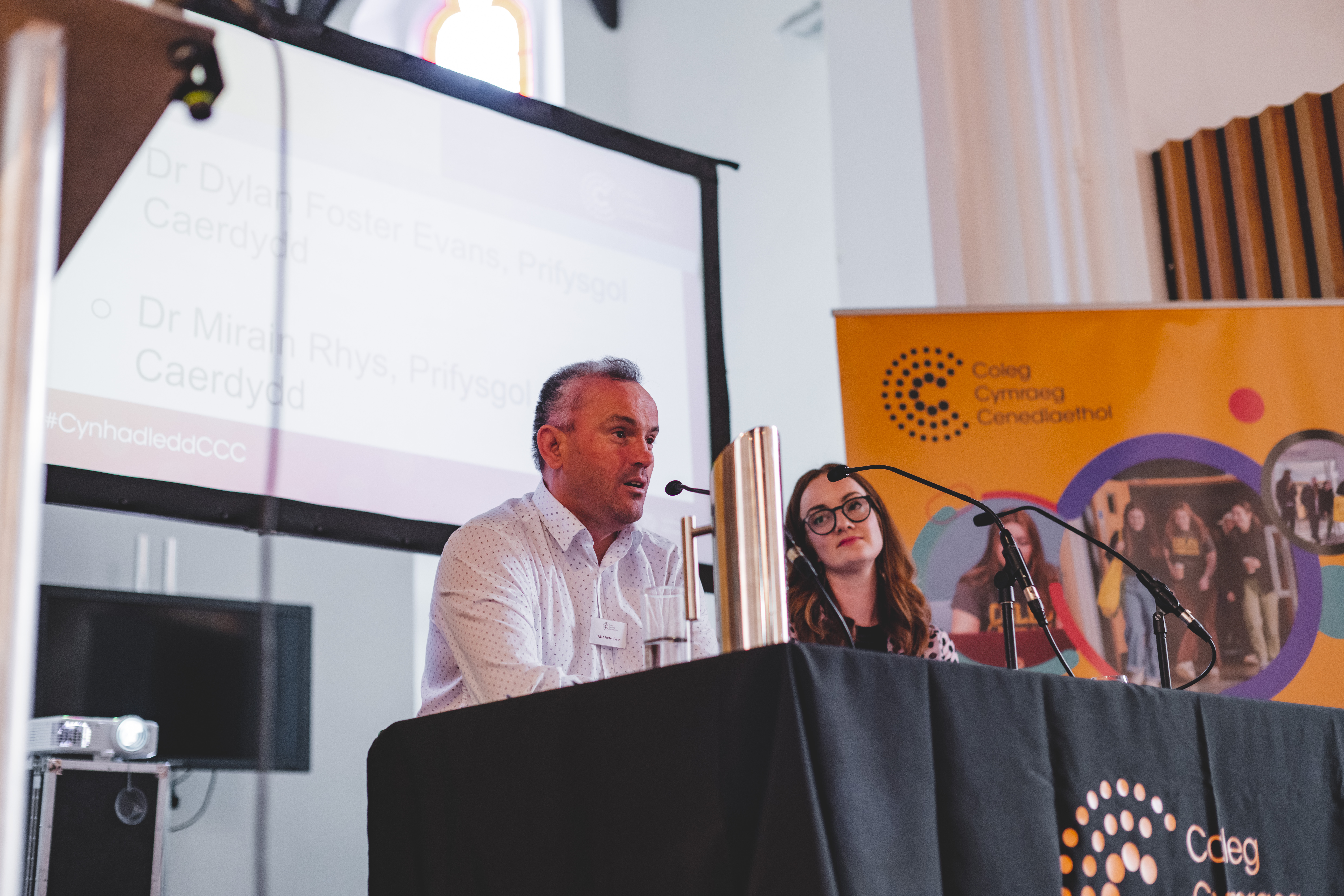It was a pleasure to attend the Coleg Cymraeg Cenedlaethol conference, and to have the opportunity to speak to staff in the higher education, further education and apprenticeship sectors. I really enjoyed the experience and had the opportunity to speak to individuals from organisations across Wales. It was great to see so many there, and everyone shared the aspiration to increase Welsh medium and bilingual provision in the post-compulsory sector.
The importance of the post-compulsory sector in the context of the Welsh Government's Welsh 2050 strategy
Since starting as Commissioner, I have made it clear that I am particularly interested in increasing opportunities for young people to learn and use Welsh. They are the future of the Welsh language after all – and it would be good for us all to try to see the world through the lens of young people, and start thinking long term about what would be best for them.
The post-compulsory education and training sector plays an absolutely key role in the above context. This is the period that bridges statutory education and the real world and the world of work. The sector therefore contributes in a very direct way to the aim of creating Welsh speakers who want to use the language in the longer term. This is why I see this sector as absolutely central to, and wider than, my vision as a Commissioner.
Creating a Welsh-language workforce and workplaces
There are now around 125 organisations across Wales under the Welsh Language Standards regime, and more are on the way. These include some of Wales' largest public institutions and there is no question that the standards regime significantly increases the demand for individuals who can work bilingually. A key part of meeting this growing demand will be ensuring that the education sector creates a workforce with adequate Welsh language skills, strategically distributed across and within different institutions.
This focus on creating Welsh-language workplaces, and increasing the use of Welsh in workplaces and within organisations, is a prominent area where my work as a Commissioner and the work of the Coleg Cymraeg Cenedlaethol intersects. This area has the potential to lead significant changes. I think we as an organisation have to try to focus on those areas where we have the most influence and the ability to drive significant changes. Maintaining the skills and use of Welsh speakers after they leave the statutory sector increases the likelihood that individuals will use Welsh more widely. Increasing opportunities for individuals to use the language while working is bound to have an influence on people's perception of the importance of the language as well as the opportunities for them to gain linguistic confidence. It could also affect individuals' will and ability to use the language when they are raising their own children, or make decisions about their children's language medium of education. It's an incredibly important part of the puzzle.
Policy, legislation and support the growth of Welsh medium and bilingual post-compulsory education
Clearly, it is not lightly that we will realise this vision in terms of the contribution of the post-statutory sector to the Welsh 2050 strategy. Achieving the vision will require the Government and other relevant organisations to use all their powers and resources to support the Coleg's work to expand welsh and bilingual medium compulsory post provision.
It is vital that the Welsh Government's vision and targets around education and the Welsh language is fully integrated into education policy and legislation agendas. This is particularly true in the case of the post-compulsory sector, which has historically received less strategic attention compared to the statutory sector. You don't need to be reminded that the establishment of the Coleg in 2011 and more recently the decision to extend the Coleg's function to include the further education sector and work-based learning is a turning point in this context. Despite this, it is clear that there is still a significant task ahead of us.
In this context it is very appropriate to welcome the hastening of the establishment of the Tertiary Education and Research Commission (Wales). The Tertiary Education and Research Act states that one of the commission's strategic duties will be to promote tertiary education through the medium of Welsh - and it is important to emphasise that meeting demand is not the principle - but that the Commission has a duty to encourage the demand for and participation in tertiary education provided through the medium of Welsh. This gives a different strategic orientation to the work of the Commission, and reflects a mindset that underpins Welsh and bilingual education planning in the statutory sector.
The obvious place to start in this context is of course the ambitious plans that the Coleg has for the further education, higher and apprenticeship sectors, as well of course and the schemes that exist among higher and further education institutions in Wales. The coleg's strategic plan for the next five years, as well as the action plan for the further education and work-based learning sector sets out an ambitious and commendable vision. To make the vision a reality, however, it is essential that the resources and funding follow. It is unrealistic to expect that continuing to invest in the same way as the past in some way is going to lead to completely different outcomes – the investment has to reflect ambition and vision.
I would like to thank the Coleg again for welcoming me to the conference, and for giving me the opportunity to discuss issues that are absolutely central to my work and vision as Commissioner. Be readily aware that it is not just the responsibility of one body or one organisation to ensure an increase in the number of Welsh speakers. In working together to encourage our young people, new learners and speakers, families with children and Welsh speakers of all ages to enjoy the language and use it at every opportunity, we will ensure that we are one step closer to realising the vision of a Wales where everyone can live their life through the medium of Welsh.





